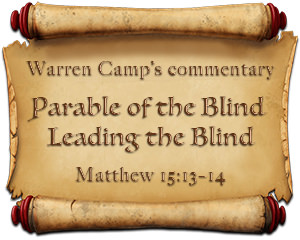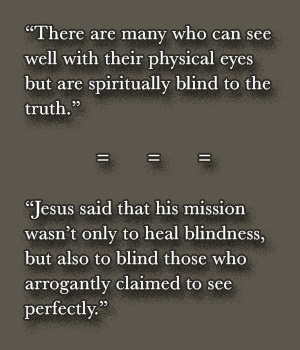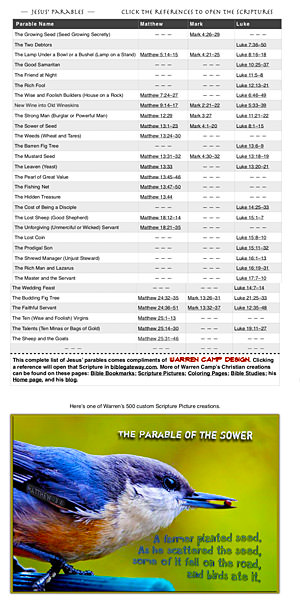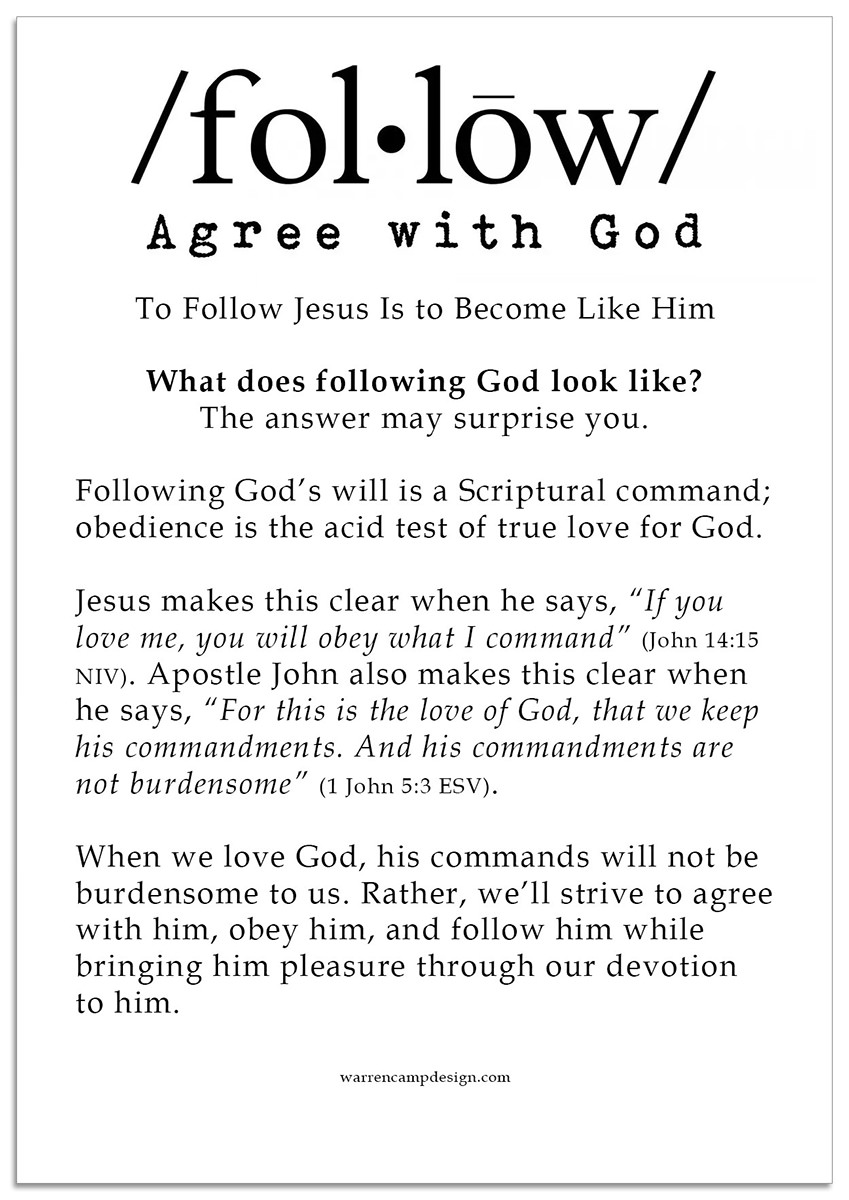The “blind” in this parable often refers to uninformed and incompetent people leading others who are similarly incapable. Those blind people who lead others denote, in general, all those who are without the understanding of truth yet pretend to teach truth.
Because students are expected to follow and act fundamentally the same way that their teacher had instructed them, if a teacher were blind, his or her dedicated students would also be blind to the truth.
— Preview —



Click the list or the “bird” to enlarge and use Warren’s list of forty-four of Jesus’ parables (a PDF file with links to Scriptures).
par•a•ble [noun] a simple story used to illustrate the meaning of or a moral or spiritual lesson, as told by Jesus in the gospels
synonyms: allegory, moral story/tale, fable
Jesus’ Parable of the Blind, Leading the Blind
Matthew 15:13–14; Luke 6:37–40
The parables that Jesus told often portray people making tragic and terrible mistakes, or on the other hand, being wise and avoiding such mistakes. People generally seem blind to the terrible mistakes they make in life.
This Parable of the Blind, Leading the Blind fits well into the theme of Christian Living. Christ’s poignant stories so vividly present our mistakes in life. It’s hard to remain blind, once the point of a parable sinks in, if only we’ll let it in. A burden of Jesus’s teaching is to enlighten humankind, to help us realize the mistakes we’ve made, and learn how we can prevent them. Over all, the following two presentations of this parable’s meaning and purpose, as revealed in Matthew’s and Luke’s gospels, ought to sufficiently paint a good picture.
The Parable of the Blind, Leading the Blind
Matthew’s Account, First
Looking back in history, Jewish leaders exalted the Bible but didn’t know God. When Jesus did his mercy-filled work of redemption, not only did they resist him, they also deceived the people and colluded with the Roman government to condemn and kill him. Meanwhile, the Jewish people believed that the chief priests, scribes, and Pharisees were most knowledgeable about the Bible and, as a result, devotedly served God. Based on that assumption, the Israelites blindly followed the religious leaders. In the end, they embarked on a road of no return that sought to wholeheartedly resist God. However, Jesus’ disciples, tax collectors, a Samaritan woman, Nicodemus, and many more, recognized the Lord’s voice and realized that Jesus was, in reality, the coming Messiah. They’d humbly listened to his words, seen him perform numerous miracles, and, as a result, gained salvation through the Lord Jesus.
The Pharisees boasted that they were hearty guides to the spiritually blind of Israel. They claimed to have been given the role of showing the ignorant masses the way to God. But the truth was that they themselves were blind! A blind man who claims he can see cannot be helped. The Pharisees and [so-called] teachers of the Law were hypocrites, as proven by the fact that they were offended by the truth. People who love the light delight in correction so that they may live in the light. But those who love the darkness are offended at any exposure. And hypocrites who love the darkness are destined for destruction. So stay away from them, lest they lead you into a pit or ditch.
We must start by putting this two-verse miniparable into context. In Matthew 15:10–11, Jesus spoke to the multitude about their excessive regard for outward form in religion. Having dealt with the religious leaders, Jesus now instructed the common people about authentic godliness. He stated a fundamental principle: Eating with “unclean hands” or any other such thing that we put into us isn’t what’s defiling; rather, it’s what comes out that defiles and reveals our unclean (defiled) hearts. In v. 12, his disciples asked him if he knew that the Pharisees had become offended by what Jesus had just told them about what typically came out of their mouths, thereby defiling them.
This is a humorous scene. The disciples came to Jesus, telling him something like this: Jesus: Did you know that you offended those guys? Of course Jesus knew that he’d offended them! He fully intended to offend them, especially the way that they valued man’s traditions so highly. At that point, he advised them that all plants [people] whom Father God hadn’t planted would be uprooted and discarded. This applied directly to all of the religious leaders. Their commandments to the Israelites wouldn’t be meaningful or lasting because they weren’t rooted in God or his truth. According to Charles Spurgeon, “There was no need for the disciples to combat the Pharisees; they would be uprooted in the natural order of things by the inevitable consequences of their own course.”
13He replied, “Every plant that my heavenly Father has not planted will be pulled up by the roots. 14Leave them; they are blind guides. If the blind lead the blind, both will fall into a pit” (Matthew 15:13–14).
When Jesus began v. 14 with “Leave them,” he didn’t organize a focused “Anti-Scribe and Anti-Pharisee” committee. He knew that their efforts would fail under the weight of their legalism. In his critical comment to his disciples — “... they are blind guides. If the blind lead the blind, both will fall into a pit” — we need to appreciate that Jesus said this with sadness; perhaps with more sadness for those subjects who were being led by the blind, rather than the blind leaders of the blind.
Although the Pharisees and teachers of the Law benefited by having scrolls, memorizing and reciting the Scriptures, and interpreting them in synagogues, they didn’t fully understand them. Neither did they apply them in their lives and their teaching. Sadly, the Pharisees who were blind failed to see Jesus as the prophesied Messiah. Because they refused to accept and follow Jesus, they didn’t understand and live their lives according to the Scriptures.
In these words of Jesus that are found in two verses of Matthew’s gospel, we ought to see the guilt to be felt by those who were blind leaders of the blind. We should also see the responsibility of followers to make sure that their leaders (and ours) aren’t blind.
Luke’s Account
When was the last time you were blamed for something you didn’t do? Unless you’re a hermit, it probably happens pretty often. Sometimes the blame comes from family, church members, your teachers, your parents, your pastor, your boss at work, and so on. But in Luke's opening verse, Jesus wasn’t talking about mere garden-variety judgment. It’s likely he was speaking about the harsh criticism from his enemies. After all, this passage comes directly after Jesus’ instruction to “love one’s enemies and persecutors” (Luke 6:27–36). Presumably, Jesus was teaching his disciples from personal experience — he was dealing with false condemnation from the Pharisees who were increasingly attending his meetings and spreading criticism about him. He was explaining to his disciples how he dealt with his enemies.
This miniparable passage is found in what is known as the Sermon on the Plain, which is Luke’s version of the Sermon on the Mount that we find in Matthew’s gospel, chapters 5 through 7. Many of the teachings in both gospels are identical, with occasional differences in wording or emphasis. The differences can be interesting because Matthew’s was written from a Jewish perspective while Luke’s was written from a more universal perspective.
It’s all Greek to me. In Luke’s account, this parable’s first pair of phrases represents Greek “synonymous parallelism” (described below).
Judging Others
37“Do not judge, and you will not be judged (krino passive). Do not condemn (katadikazo), and you will not be condemned (katadikazo passive)" (Luke 6:37a–b).
Here is what the Greek words mean: krino (pronounced kree'-no) — a fairly common word, used here "as a legal technical term, 'to judge, decide, hale before a court, condemn,' also 'hand over for judicial punishment'"; and katadikazo (pronounced kat-ad-ik-ad'-zo — "to condemn, find or pronounce guilty."
We can’t live without making judgments. Children are vulnerable because they don’t have the experience to size up a situation and take absolutely wise, safe, courses of action. As children grow, they encounter a wide variety of circumstances, hopefully with their parents or teachers nearby to guide them. With experience comes discernment; with discernment comes greater safety. What Jesus is talking about here isn’t the discernment that’s necessary to guide our immediate action so we can survive. He’s referring to the outright condemnation and sentencing of others that we ought to defer to a court of law.
We come next to the “forgiving and giving” elements of this miniparable. Jesus follows his two negative “Do not!” commands with two positive ones:
“Forgive (apoluo), and you will be forgiven (apoluo passive). 38Give (didomi), and it will be given (didomi passive) to you” (Luke 6:37c–38a).
Did you notice the parallelism again? The first two clauses say essentially the same thing while the second two state the other side of judging, that is, forgiving and giving. The Greek words used are fairly common: apoluo (pronounced ap-ol-oo'-o) — "to set free, release, pardon"; and didomi (pronounced did'-o-mee) — "to give, grant, bestow, impart.” The first pair of negative commands tells us disciples not to be judgmental, condemnatory, blaming, faultfinding, critical people. The second pair of positive commands tells us to be forgiving, generous, merciful, gracious, and tenderhearted people.
Next, we come to the follow-up element in this miniparable that refers to “choosing your measuring cup.” Jesus goes on to talk about the degree of our generosity by giving it a means of measurement, as shown in v. 38.
“Give, and it will be given to you. A good measure (metron), pressed down, shaken together and running over, will be poured into your lap. For with the measure (metreo) you use, it will be measured (antimetreo) to you” (6:38).
The key Greek words here are: metron (pronounced met'-ron) — "'to measure,' an instrument for measuring"; metreo (pronounced met-reh'-o) — "to measure, give out, deal out, apportion"; and antimetreo (pronounced an-tee-met-reh'-o) — "measure in return." What Jesus is saying is that you’ll get back what you give out, whether it’s judgment or forgiveness. Note: You’ll receive proportionately what you’ll dispense. That is, if you dispense forgiveness using a teaspoon, you’ll receive back teaspoon-size portions. But if you dispense forgiveness using a bushel-basket amount, you’ll receive overflowing forgiveness!
Warning and Recommendation When you neglect God and skimp on giving toward him, your life will become shaky. However, when you give to him, put him first, and honor him with the firstfruits of your earnings, he’ll surely bless you economically.
What’s important in these first two verses is the clear and absolute quality of the statements therein. There’s a definite cause-and-effect process at work. It’s not: Do not judge. As a reward, God will cut you some slack and refrain from judging you. Instead, it’s strong, simple, clear, and unequivocal. It suggests: We’re not to be ones who judge and condemn. Those are human consequences of human choices. The only thing that causes us to feel judged or condemned is our tendency to judge and condemn others. If we stop judging and condemning people, we’ll immediately prevent the rebound effect that returns to us reciprocal energies that we end up directing toward others.
The same holds true for forgiveness. If we hold grudges and resentments, we’ll absolutely continue to feel those negative energies in our lives. But if we want to feel less personal guilt, we must agree to free others from our guilty verdicts of them.
Now we come to the heart of this parable: the blind who lead the blind. In vv. 39–40, Jesus gives us two more short, distinct, miniparables to illustrate the principle of “spiritual blindness.” In these two verses there seems to be a shift. In vv. 37–38, Jesus has been teaching his disciples how they’re to respond to their enemies. But now he seems to focus on those prejudices within the disciples themselves, not just in Jesus’ enemies. The “blind, leading the blind” miniparable appears in v. 39 . . .
39He also told them this parable: “Can the blind lead the blind? Will they not both fall into a pit?” (v. 39)
Jesus had also referred to the Pharisees as “the blind, leading the blind” in Matthew’s account of this miniparable (15:14). Here in Luke’s account, he may have the Pharisees in mind as well while he also admonishes his disciples. He seems to be saying, If you follow the teachings of the spiritually blind Pharisees, then you’ll fall into the same traps that they fall into. Then in v. 40, covered below, Jesus seems to refer not to the Pharisees and their disciples, but to himself and his disciples. It’s as if he were saying, Listen carefully and don’t think you know it all. If you want to be able to judge and discern accurately, you need to be fully trained by me and undergo a spiritual change of heart.
It was well-known that those who were blind weren’t qualified or capable of being a guide to anyone, much less the blind. But this miniparable has a broader application because there are many who can see well with their physical eyes but are spiritually blind to the truth. The problem, of course, is that most spiritually blinded men and women don’t know they’re blind and they consider others to be blind.
This gives us the backdrop for Jesus’ student-and-teacher-related passage in v. 40 that follows the “blind leading the blind” miniparable. His main point herein is that when blind pupils learn from blind teachers, they cannot rise above or surpass their teacher; at best, they can only become equal to their teacher, as revealed in this closing verse.
40The student is not above the teacher, but everyone who is fully trained will be like their teacher” (v. 40).
In other words, when people learn from blind teachers, they remain blind because the pupil, “after he has been fully trained, will be like his teacher.”
It’s likely that everyone is blind in one or more areas of understanding. If we knew where we were blind, we’d then attempt to see what we needed to see and no longer be blind. The problem with blindness (by definition) is that we don’t know where exactly we’re blind. For this reason, we’re given the Holy Spirit as our “teacher.” Apostle John calls this divine Teacher “the Spirit of truth” (John 14:16–17; 15:26; and 16:13).
In the days of Moses, the Spirit of God provided many signs, wonders, and miracles, which the people clearly saw with their eyes. However, that church in the wilderness remained blind because they were too afraid to hear God’s voice and receive the Spirit at Mount Horeb (Exodus 20:18–21). Later, however, Jesus knew that some of his disciples would draw near to God in the upper room where they’d receive the Spirit. Yet even so, history shows that much of the New Testament church had remained bound by Old Covenant theology and thought patterns. Many of that church body remained blind, especially after the spiritual gifts they’d received had appeared to have dwindled, replaced by worldly talent and effectiveness. So we see it said of the Laodicean Church in this passage from Revelation (with emphasis added) . . .
“You say, ‘I am rich; I have acquired wealth and do not need a thing.’ But you do not realize that you are wretched, pitiful, poor, blind, and naked. 18I counsel you to buy from me gold refined in the fire, so you can become rich; and white clothes to wear, so you can cover your shameful nakedness; and salve to put on your eyes, so you can see (Revelation 3:17–18).
Meanwhile, the problem of blindness in today’s church prevails! God doesn’t condemn his believers for their blindness, but he reserves sharp judgment for blind leaders who lead people without including and presenting a genuine revelation that comes directly from the Spirit of Truth. Luke’s miniparable in 6;39–40 isn’t given in Matthew’s account of the Sermon on the Mount. However, later in Jesus’ ministry, when the religious leaders were offended by Jesus’ teaching, he made reference to their blindness, as shown in Matthew’s 15:12–14 account.
In Matthew 23:16–26, Jesus again says that the Pharisees were blind on account of their self-adopted traditions and misinterpretations of the divine law. And in the ninth chapter of John’s gospel, we find the primary miracle-sign (Gr., semeion, pronounced say-mi'-on) that best illustrates this. It’s the sign or miracle that John highlights in his gospel in which Jesus healed a man who’d been blind from birth. The story prophesies the fulfillment of a time to follow when blindness — both physical and spiritual — will be healed throughout the world. Instead of seeing the life-changing wonder of that miracle, the Pharisees reacted to it by excommunicating the man who’d been healed. At the end of the story in John 9:39–41, we’re given essential lessons to be learned. In summary, Jesus said that his mission wasn’t only to heal blindness, but also to blind those who arrogantly claimed to see perfectly. The Pharisees, of course, were already blind, though they didn’t realize and know it. Their rejection of the truth sealed their spiritual blindness.
To be spiritually and mentally blind is to be ignorant. Paul himself had been a blind Pharisee! But those Pharisees who saw the miracle that Jesus had performed when he healed the man born blind didn’t claim blindness or ignorance. They saw what Jesus had done and realized that he could do even more. Nevertheless, they’d already rejected Jesus as being the Messiah; they refused to believe, even in the face of such miraculous evidence. These “blind leaders” then convinced the Judaeans to reject Jesus as Messiah. It was a classic case of the blind, leading the blind. Thankfully, many of them received their sight, saw the Light, and ignored the teaching of their blind leaders, thus avoiding the locked-in blindness that characterized their self-motivated leaders.
“If the blind lead the blind, both will fall into a pit” (Matt. 15:14b).



